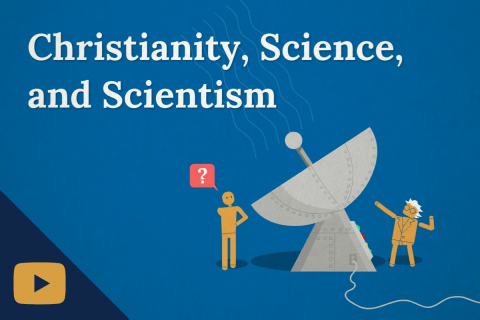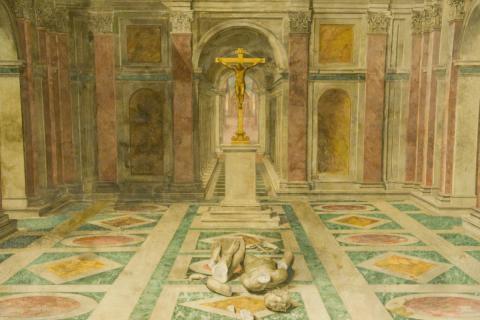
While scientism denies the existence of anything beyond the material world, the Christian sacramental vision affirms the existence and intermeshing of realities visible and invisible.
Science, Scientism, and Sacramentality
In our ongoing attempt to envision the world accurately, which means trying to overcome our natural blindness and to see things the way God sees them, it helps to consider those common ways of looking at the world around us that are out of step with true sight and to do what we can to regain a clear vision. One such lens that permeates our current culture and inflicts our sight with a kind of astigmatism is the lens of scientism. Philosophers have also called this way of viewing things by the name of 'positivism.' The Christian view of the world is not scientistic or positivistic; it is sacramental. In order to understand this distinction, it will help to get our terms straight and to note the meaning of these three terms in particular: 'science,' 'scientism,' and 'sacramentality.'
'Science' refers to the ordered study of a particular body of knowledge according to a methodology suited to what is being studied. We most often use the word in a narrow sense to refer to the natural sciences, including chemistry, physics, and biology. We also speak of social sciences such as economics, political science, and sociology. In its original meaning, 'science' could refer to any ordered study of some aspect of reality. To view things scientifically is to perceive the various facets of the whole of reality in the light of what is known through appropriate investigation. The traditional university is founded on this kind of vision: the various schools and departments represent the study of different aspects of the cosmos, and the presence of all the disciplines within a single university keeps the totality of things in view.
'Scientism' refers to the philosophical claim that nothing exists beyond what can be ascertained by the methods of natural science. According to a scientistic vision of the world, there is nothing beyond the physical world: there is no such thing as meta-physics. Only that which can be measured, observed, weighed, or somehow shown to belong to the physical world is real. Anything not observable in such measurable ways, apart from abstract systems of thought like mathematics, must be non-existent.
'Sacramentality' refers to a way of seeing the world that claims that there exists both a visible and an invisible world, and further, that the two are intrinsically intermeshed. According to the sacramental understanding of the world, the invisible world is greater, richer, larger, and more real than the visible world, and it is lasting rather than evanescent. Sacramentality holds that the invisible world is clothed in and can be reached through visible things.
The sacramental view is neither scientistic (which holds that the visible world is all that exists) nor Buddhist or Gnostic (which hold that the visible world is illusory and unreal and needs to be escaped or repudiated). Sacramentality takes the material world seriously as having genuine reality and importance, while giving pride of place to invisible realities, in particular God and the human soul.
Contrary to a popular misconception, Christianity has never had a problem with genuine natural science. The reverse is true: the Christian sacramental vision has historically provided a rich soil for scientific advances of all kinds. Three fundamental truths upon which Christians insist have been especially science-friendly. First, Christians hold that because God created the world, it is fundamentally good and therefore worthy of study. Second, Christians hold that God accomplishes his creation through the logos – a word that means “reason” – as an expression of his inner nature. Third, Christians claim that the so-called gods who had been understood as the embodiments of natural forces were no gods at all. These three truths mean that the material world is a place of rationality and that natural processes are not under the arbitrary sway of wayward spirits who need to be propitiated. Under such conditions, the ordered study of the visible world is a coherent possibility. It is no accident that the scientific revolution took place in a society imbued with a Christian vision of reality.
While there is no intrinsic opposition between Christianity and science, there has been a sharp conflict between Christianity and scientism ever since scientism first emerged as a serious contender in the nineteenth century. Genuine science and a sacramental understanding can and often do work hand in hand. On the other hand, scientism and sacramentality are two opposing philosophic views that cannot both be true. The supposed “battle between science and religion” is not a fight between true science and Christianity: it is rather a fight between the thin philosophy of scientism, sometimes amounting to a religion of its own, and the much thicker Christian faith. It is a fight that cannot be resolved by appeals to natural science because the claims of both sides go beyond natural-scientific evidence. When an attack against Christianity is made in the name of science, it is almost always flying under false colors. It is scientistic philosophy posing as natural science. This maneuver provides its philosophical claims with the mantle of scientific authority, but it is not really science at all.
Contrary to a popular misconception, Christianity has never had a problem with genuine natural science. The reverse is true: the Christian sacramental vision has historically provided a rich soil for scientific advances of all kinds.
To take an example that might help make the matter clearer: Imagine someone you know has been studying radio waves and has invented an impressive satellite dish that can pick up every kind of radio wave in existence. You are being shown the instrument by its inventor, and you are impressed by its sophistication and the wealth of information it provides; it essentially covers the world of radio waves. At a certain point you pose the question: “I wonder if there are other kinds of waves out there that aren’t radio waves.”
You are surprised and interested by this claim.
“How do you know that?” you ask.
“Because we’ve never picked up anything but radio waves on the dish.”
You are a little confused.“But I thought your dish was fashioned precisely to pick up only radio waves.”
“Right.”
“So what if there are other kinds of waves?”
“But we know there aren’t.”
“Because…?”
“Because radio waves are all we can detect with our dish.”
Something similar can happen with certain supporters of a scientistic view. They will note, rightly, that God, angels, and the human soul cannot be measured or observed by the methods of natural science. They will then say: “Science makes clear that such things don’t exist.” If you ask “How is that?” the answer will often be: “Because if they did exist, we would be able to see or detect them scientifically.” If you then reply “But what if there is a whole order of reality that is not material, and therefore cannot be detected by the methods of natural science?” the answer comes back: “No, such an immaterial reality doesn’t exist, because our scientific investigations don’t pick them up.”
Time to talk about the weather.
It is worth noting that the scientistic view is very narrow: if it is true, it leaves us with a much smaller and more boring world than the one presented by the Christian sacramental vision. The Christian vision grants all that Scientism suggests as far as the visible world goes, but it adds infinitely more.
Jesus stopped and called them, saying, "What do you want me to do for you?" They said to him, "Lord, let our eyes be opened." And Jesus in pity touched their eyes, and immediately they received their sight and followed him.
Seven Aspects of the Christian Sacramental Vision
What follows is a brief and partial take on the contours of the Christian sacramental view of the world. The point in noting these aspects is not to give a full account of all things sacramental. These snapshots are meant simply as a help in sharpening our eyesight.
1. Everything has a meaning.
In the Christian sacramental vision, the whole of reality is imbued with meaning. Nothing is lost or unimportant, since everything, down to the last detail, has been brought about by the loving mind of God. The world in which we live is not Macbeth’s “tale told by an idiot, full of sound and fury signifying nothing.” Rather, G.M. Hopkins’ claim rings true: “The world is charged with the grandeur of God; it will flame out, like shining from shook foil.” We are told that God takes thought for the life and death of every sparrow, and that “even the hairs of your head are numbered" (Luke 12:7). The visible world around us is rich in meaning, veiling and partly revealing the invisible world that undergirds it.
2. Christ is the center of the sacramental world.
The divine Son of God-made-man is the heart of the sacramental world, the burning center from which everything else emanates. In Christ, the union of the material and spiritual worlds and the revelation of the invisible world through the visible has its source and its most powerful expression. The humanity of Christ is the sacrament of his divinity, the visible road to that invisible reality. Christ himself is the sacrament of the Father, a kind of veil that both hides and reveals the invisible God to those given eyes to see. As Jesus said, “He who has seen me has seen the Father” (John 14:9).
The center of sacramental reality in Christ echoes through the whole of the rest of creation. The Church is the continuing sacrament of Christ, the visible and outward clothing of the invisible and divine presence of the Holy Spirit. The seven sacraments are especially intense manifestations of Christ’s sacramental presence. A body is plunged into water, and an immortal soul is transferred from the kingdom of darkness to the Kingdom of God. Bread and wine are brought to the altar and become the body and blood of Christ. The beauty of the visible world speaks of God’s power and goodness: “The heavens are telling the glory of God” (Psalm 19:1). Visible things are signposts and roads that penetrate to invisible realities.
3. Our bodies are sacraments of our souls.
By the Christian sacramental vision, we see that humans are not a kind of organic machine, “wetware” that houses the “software” of our electronic brains. That way of seeing is massively distorted. Instead, we perceive that we are immortal souls clothed in bodily materiality. We have been made for this union of the visible and invisible, of the material and spiritual, and the neglect of either will distort our understanding of both. We enter into spiritual contact with each other through the sacrament of our physical powers. Speech, sight, and touch are so meaningful to us because they open out our inner invisible being to one another. Christian attitudes toward such things as sexuality, ways of dress, and respect for the remains of the dead come into clear focus by the light of this sacramental vision. Our material bodies have a profound meaning written into them, and what we do with them has great significance in the spiritual realm.
4. Meals are sacramental.
It has been said that food is God’s love made edible. The Christian sacramental vision allows us to see that every meal is an echo of the mysterious life at the center of the cosmos. Each meal is a reminder of the Eucharistic meal where we are fed on God himself, the nourishment that will open the gates of eternity to us. Each Eucharist is an anticipation of and a participation in that final feast, the great banquet where the menu will be truth, goodness, beauty, love – God himself in his fullness. Under the influence of that sacramental vision, Christians order their meals with a kind of liturgy. We set aside a specific time to gather together, we set the table and take our places, we pray thanks, and we go through the course of the meal remembering both our physical and spiritual nature and keeping our eyes on the needs of one another.
In the German language there are two different words that both mean “to eat.” One of them, essen, refers to human eating. The other, fressen, is used for animals. German mothers will sometimes correct their children who are going for their food like animals with the phrase, "Essen, nicht fressen!" ("Eat like a human, not like a beast!") They are calling to mind the sacramental nature of the meal, one that goes beyond appetite and physical nourishment.
The Christian injunction to fast and to feast are founded on the same sacramental vision. Restricting our eating, a purely material act, has significant consequences in the spiritual realm: it strengthens our prayer and brings power to bear against demonic forces. Feasting is an expression of the joy of life with God. So the Church commands them both. We are given a forty-day fast that is then followed by a fifty-day feast, reminding us that while we need to repent our sins and subject our often wayward passions to the rule of Christ, the heart of the Gospel is love and joy. Feasting will be eternal – fasting is the necessary medicine to get us to the feast.
5. The poor are a sacrament of Christ.
The light of the Christian sacramental vision allows us to see in those who are poor and needy a privileged vision of Christ, who became poor for our sake. Mother Teresa often spoke of Christ in his “distressing disguise” among the poor. Jesus pointed to this sacramental reality when he said, “Whatever you did to the least of my brothers – the hungry, the naked, the homeless, the sick, the imprisoned – you did to me” (Mattew 25).
6. Time is a sacrament.
Time has often been seen by humans as their great enemy, the ultimate destroyer of everything. Much of human philosophy has been aimed at escaping the ravages of time. By the light of the Christian sacramental vision, however, we learn that time is part of God’s creation, and that God works his salvation through and in time. Everything has its proper season. Christ came among us “in the fulness of time,” and we are now living in the “last times,” the age in which Christ may return at any moment. God is the weaver of time, and all things happen in their place. What seems a disaster is turned to blessing, and what we thought was a missed opportunity becomes the foundation for a new possibility. All eventually comes round to its proper place once the “appointed time” has come. So the Church orders the day and the year, and we are given times of remembering, times of fasting and feasting, times of repentance and celebration, prayers for different hours of the day and different days of the year. Through time, God continues to work out his salvation history, for each of us individually and for our race as a whole.
7. The world is an enchanted place.
The Christian sacramental vision, the true sight given us by God, reveals the world and our path through it as adventurous, dangerous, beautiful, challenging, meaningful, momentous, mysterious, and ultimately all that our hearts ache for.
Apart from the touch of Christ, we are blind. We think we see, but our vision is distorted, and we mistake real things for unreal ones, and false things for true. We need to have our sight healed and restored. Those two blind men who called to Jesus were given a key piece of wisdom: the wisdom to know that they were blind. "For judgment I came into this world, that those who do not see may see, and that those who see may become blind” (John 9:39). What a good prayer to make along with those blind men to the Giver of all good gifts: “Lord, let our eyes be opened.”


